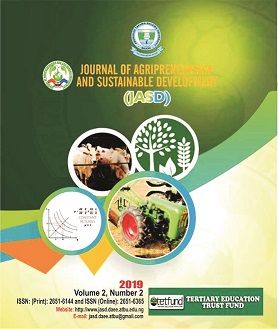EVALUATION OF THE EFFECTS OF DEFICIT IRRIGATION ON WATER USE EFFICIENCY AND CUCUMBER GROWTH UNDER GREENHOUSE MANAGEMENT, NIGERIA
DOI:
https://doi.org/10.59331/jasd.v2i2.86Keywords:
Crop Response Factor, Drip Irrigation, Deficit Irrigation, Water Use Efficiency, Water ProductivityAbstract
Water use efficiency (WUE) increment and reduction in amount of irrigation are important role played by deficit irrigation. Deficit irrigation is a well-accepted practice to optimize increase water use, thereby saving cost, by allowing crops to withstand mild water stress with no or only marginal decreases in yield and quality. Greenhouse experiments were conducted using a deficit irrigation program on cucumber crops under drip irrigation during 2018–2019 growing season, to determine the crop water requirements in greenhouse and WUE of cucumber crop using a deficit irrigation program at different stages of growth. Irrigation treatments consisted of 12 levels of ETc (20%-100%), deficit irrigation tested at different growth stages (initial, mid and late stage of growth) for a total of 12 treatments at each experiment. The maximum amount of water applied to the crop was 455 mm for the 20% ETc treatment while the minimum water applied was 247 mm for 100% ETc treatment. The ETc ranges between 223 and 407 mm for the different treatments. The results indicated that, cucumber could stand a shortage of water during the growth and water use efficiency (WUE) and water productivity (WP) values increased when water amounts decreased; these values decreased to 45.6 and 24 kg/m3, respectively. Water resource management under water scarcity bring about different policies aim at reducing the non-beneficial water uses, particularly those corresponding to water consumption and to the non-reusable fraction of the diverted water.
Downloads

Downloads
Published
How to Cite
Issue
Section
License
Copyright (c) 2022 Journal of Agripreneurship and Sustainable Development

This work is licensed under a Creative Commons Attribution 4.0 International License.






